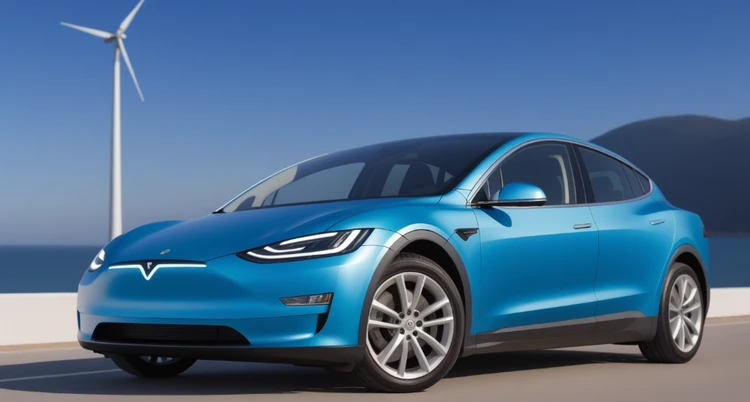🌿🔋 Electric cars: a new era in the fight against global warming
In a world where climate change is becoming increasingly noticeable, electric vehicles (EVs) offer a promising solution. Learn more about the environmental contribution of electric vehicles here and discover how this technology can help reduce the environmental impact of transportation and slow the rate of global warming.
📈🌡️ The impact of traditional cars on the climate
Fossil fuel use
Traditional fossil fuel-powered cars are large sources of CO2 emissions. Their exploitation leads to an increase in the concentration of greenhouse gases in the atmosphere, which causes global warming.
Emissions problem
Car exhaust contains not only CO2, but also other harmful substances such as nitrogen oxides and particulate matter, which pollute the air and contribute to the greenhouse effect.
Resource intensity of production
Producing fossil fuel vehicles also involves high energy costs and emissions, from the extraction of raw materials to the production process itself.
🌍🛠️ Electric vehicles as a tool for sustainable development
Reducing greenhouse gas emissions
Electric vehicles significantly reduce greenhouse gas emissions because they produce no direct emissions during operation. This makes them an attractive option for reducing overall emissions in the transport sector.
Dependence on energy sources
The effectiveness of electric vehicles in combating global warming depends directly on the energy sources used to charge them. The more electricity produced from renewable sources, the smaller their carbon footprint will be.
Battery Innovation and Technology
Advances in electric vehicle battery technology are improving their energy efficiency and extending their lifespan, which also helps reduce their environmental impact.
📊🌿 Comparative analysis of environmental impact
Life cycle of a car
Research shows that over their entire life cycle, electric vehicles have a lower carbon footprint than traditional vehicles. This includes everything from production and operation to disposal.
Reducing pollution in the city ah
Electric cars help reduce air pollution in cities because they do not produce exhaust gases. This improves air quality and contributes to a healthier urban environment.
Potential for use in public transport
The use of electric vehicles for public transport can significantly increase their positive environmental impact, reducing the number of traditional cars on the road and therefore overall emissions.
Renewable energy and electric vehicles
Combining electric vehicles with renewable energy sources enhances their environmental potential. In countries with high levels of solar and wind energy use, such as Germany and some US states, electric vehicles are becoming truly green transport.
Education and awareness
Increased awareness and educational programs aimed at promoting electric vehicles are driving their wider adoption, which in turn increases their positive environmental impact.
Government support and incentives
Many governments are offering various incentives and benefits for the purchase of electric vehicles, making them more affordable for the general public and accelerating the transition away from fossil fuel vehicles.
🔄 Disposal and recycling
Battery recycling problems
One of the problems associated with electric vehicles is the disposal and recycling of their batteries. Developing efficient and environmentally friendly battery recycling methods is key to the long-term sustainability of the electric vehicle industry.
Battery recycling
Ways to reuse used EV batteries, for example as stationary energy storage, are being explored, which could reduce the overall environmental impact.
Legislative regulation
Some countries already have laws requiring electric vehicle manufacturers to make batteries recyclable, encouraging the search for environmentally friendly solutions.
💡 Innovations in the electric vehicle industry
Charging infrastructure development
The development and expansion of charging station infrastructure is critical for the ease of use of electric vehicles and their popularization among the population.
Improving battery performance
Continuous research is aimed at improving the characteristics of batteries: increasing their capacity, reducing charging time and increasing reliability.
Autonomous driving
Integrating autonomous driving technologies into electric vehicles can help improve safety, reduce accidents and, as a result, reduce environmental pollution.
📊 Tables and statistics
The table below provides comparative statistics on carbon dioxide (CO2) emissions between electric vehicles and fossil fuel vehicles over their life cycle (production, operation, disposal):
| Parameter | Electric cars | Traditional cars |
|---|---|---|
| Production | Higher | Below |
| Exploitation | Much lower | Higher |
| Disposal | Average | Average |
The table shows that despite higher production rates, operational emissions from electric vehicles are significantly lower, which makes them a more preferable choice from an environmental point of view throughout their entire life cycle.
🌱 Environmental initiatives and partnerships
The international cooperation
International cooperation in the development of standards and regulations for electric vehicles contributes to the unification of technologies and the exchange of best practices in the environmental field.
Partnership with renewable energy producers
Many electric vehicle manufacturers are entering into partnerships with renewable energy companies to create comprehensive green solutions.
Environmental educational programs
Electric vehicle manufacturers and environmental organizations are launching educational programs to raise public awareness of the environmental benefits of electric vehicles.
📸 Data visualization
Using infographics and data visualizations helps the public better understand the benefits of electric vehicles and their impact on reducing global warming.
🔍 Research and development
New materials for batteries
Research into new battery materials is aimed at reducing weight, increasing efficiency and reducing harmful emissions during battery production and disposal.
Energy management systems
The development of intelligent energy management systems contributes to more efficient use of electricity and increased mileage per charge.
Improved fast charging technology
Technological breakthroughs in fast battery charging can significantly reduce charging times, making electric vehicles more convenient for daily use.
🗣️ Public opinion and perceptions
Surveys and sociological research
Regular surveys and sociological studies show that public consciousness towards electric vehicles is becoming more and more positive, which contributes to their popularization.
User reviews
Reviews from electric vehicle owners often highlight ease of use, reduced operating costs and positive environmental effects.
Impact on legislation
Positive public perception of electric vehicles influences legislative initiatives aimed at stimulating their adoption and supporting environmentally friendly transport.

